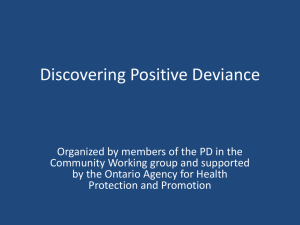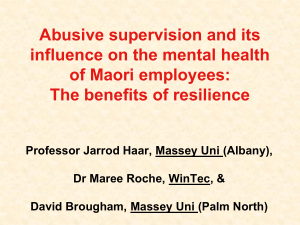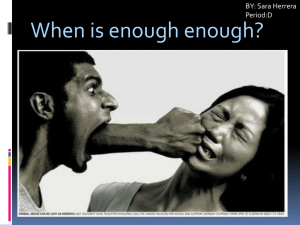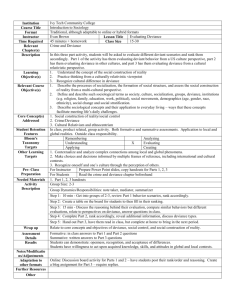Abusive Supervision, Workplace Deviance & the Moderating Effects
advertisement
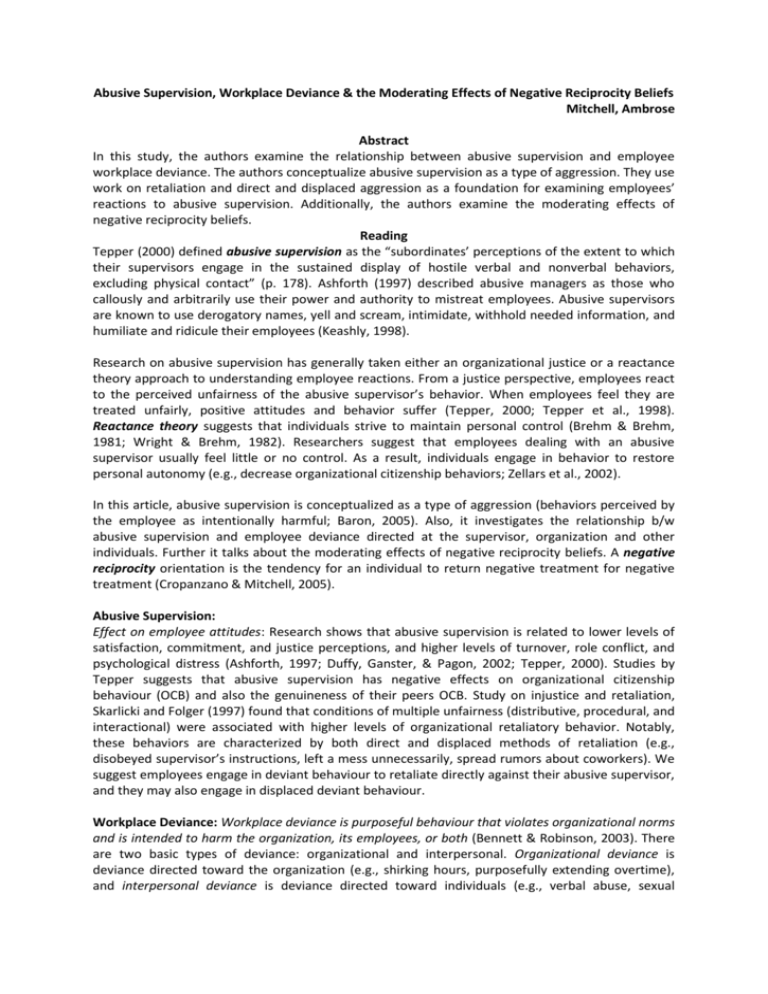
Abusive Supervision, Workplace Deviance & the Moderating Effects of Negative Reciprocity Beliefs Mitchell, Ambrose Abstract In this study, the authors examine the relationship between abusive supervision and employee workplace deviance. The authors conceptualize abusive supervision as a type of aggression. They use work on retaliation and direct and displaced aggression as a foundation for examining employees’ reactions to abusive supervision. Additionally, the authors examine the moderating effects of negative reciprocity beliefs. Reading Tepper (2000) defined abusive supervision as the “subordinates’ perceptions of the extent to which their supervisors engage in the sustained display of hostile verbal and nonverbal behaviors, excluding physical contact” (p. 178). Ashforth (1997) described abusive managers as those who callously and arbitrarily use their power and authority to mistreat employees. Abusive supervisors are known to use derogatory names, yell and scream, intimidate, withhold needed information, and humiliate and ridicule their employees (Keashly, 1998). Research on abusive supervision has generally taken either an organizational justice or a reactance theory approach to understanding employee reactions. From a justice perspective, employees react to the perceived unfairness of the abusive supervisor’s behavior. When employees feel they are treated unfairly, positive attitudes and behavior suffer (Tepper, 2000; Tepper et al., 1998). Reactance theory suggests that individuals strive to maintain personal control (Brehm & Brehm, 1981; Wright & Brehm, 1982). Researchers suggest that employees dealing with an abusive supervisor usually feel little or no control. As a result, individuals engage in behavior to restore personal autonomy (e.g., decrease organizational citizenship behaviors; Zellars et al., 2002). In this article, abusive supervision is conceptualized as a type of aggression (behaviors perceived by the employee as intentionally harmful; Baron, 2005). Also, it investigates the relationship b/w abusive supervision and employee deviance directed at the supervisor, organization and other individuals. Further it talks about the moderating effects of negative reciprocity beliefs. A negative reciprocity orientation is the tendency for an individual to return negative treatment for negative treatment (Cropanzano & Mitchell, 2005). Abusive Supervision: Effect on employee attitudes: Research shows that abusive supervision is related to lower levels of satisfaction, commitment, and justice perceptions, and higher levels of turnover, role conflict, and psychological distress (Ashforth, 1997; Duffy, Ganster, & Pagon, 2002; Tepper, 2000). Studies by Tepper suggests that abusive supervision has negative effects on organizational citizenship behaviour (OCB) and also the genuineness of their peers OCB. Study on injustice and retaliation, Skarlicki and Folger (1997) found that conditions of multiple unfairness (distributive, procedural, and interactional) were associated with higher levels of organizational retaliatory behavior. Notably, these behaviors are characterized by both direct and displaced methods of retaliation (e.g., disobeyed supervisor’s instructions, left a mess unnecessarily, spread rumors about coworkers). We suggest employees engage in deviant behaviour to retaliate directly against their abusive supervisor, and they may also engage in displaced deviant behaviour. Workplace Deviance: Workplace deviance is purposeful behaviour that violates organizational norms and is intended to harm the organization, its employees, or both (Bennett & Robinson, 2003). There are two basic types of deviance: organizational and interpersonal. Organizational deviance is deviance directed toward the organization (e.g., shirking hours, purposefully extending overtime), and interpersonal deviance is deviance directed toward individuals (e.g., verbal abuse, sexual harassment). Interpersonal deviance can further be divided into two types: deviant behaviours targeted against supervisors and those targeted at other individuals (Hershcovis et al., 2007). Retaliation involves the desire to punish an offender for unwarranted and malicious acts (Averill, 1982). Retaliation refers to behavior that seeks to “make the wrongdoer pay” for an event that harms or jeopardizes the victim in some meaningful way (Skarlicki & Folger, 2004, p. 374). 2004). Empirical evidence demonstrates that individuals retaliate against perceived injustices, threats to identity, violations of trust, and personal offense. When individuals feel they have been mistreated, retaliation is a deliberate, rational response (Bies & Tripp, 1996). Supervisors are reported to be the most prominent source of bullying at work (Neuman & Keashly, 2003). Indeed, both theoretical and empirical research suggests abusive supervision is related to retaliation. Jones (2003) found that interactional injustice from an authority was significantly related to supervisor-directed retaliation. Further, a recent meta-analysis by Hershcovis et al. (2007) found that unfair supervisor treatment was a strong predictor of supervisor-targeted aggression. Research on displaced aggression suggests that individuals who become angry and frustrated by a harm-doer may displace their aggression on individuals who are not the source of the harm (Dollard et al., 1939). Dollard et al. (1939) offered two reasons why individuals displace aggression. First, the harm-doer may not be available to retaliate against. Second, the victim may fear further retaliation from the harm-doer. Should either of these constraints occur, direct retaliation is curbed (Baron, 1971) and aggressive behaviours may be redirected or displaced on less powerful or more available targets (e.g., co-workers; Miller, 1941). The study conducted in this article supported the following three hypotheses: a) Abusive supervision will be positively related to supervisor-directed deviance. b) Abusive supervision will be positively related to organizational deviance. c) Abusive supervision will be positively related to (nonsupervisory) interpersonal deviance. Moderating Effects of Negative Reciprocity Beliefs: Individuals vary in their beliefs about the appropriateness of negative reciprocity. Some may believe that it is acceptable to retaliate in return of an unfavourable treatment, however some feels it is acceptable to “turn the other cheek”. Those who hold strong negative reciprocity beliefs are more likely to seek retaliation than avoidance (McLean Parks, 1998). The study in this article supports the hypothesis that ‘Negative reciprocity beliefs will moderate the relationship between abusive supervision and supervisor directed deviance but will not moderate the relationship between abusive supervision and other forms of deviance (organizational or interpersonal). Abusive supervision will be more strongly related to supervisor-directed deviance when individuals more strongly believe in negative reciprocity.’ To summarize: Previous research demonstrates abusive supervision negatively affects employee attitudes and employees’ willingness to engage in positive behaviour. The results of this study show abusive supervision influences employees’ willingness to engage in negative behaviour as well. Specifically, abusive supervision is positively related to all types of employee deviance. Moreover, the relationship between abusive supervision and supervisor-directed deviance is stronger for employees with stronger negative reciprocity beliefs. Abusive supervisory behaviour is associated not only with harm to the source of the abuse but also “collateral” damage to the organization and others in the workplace. It also talks about the anger trait (which is linked with theories of frustration-aggression). It was positively related to supervisor-directed and interpersonal deviance, but not organizational deviance.

